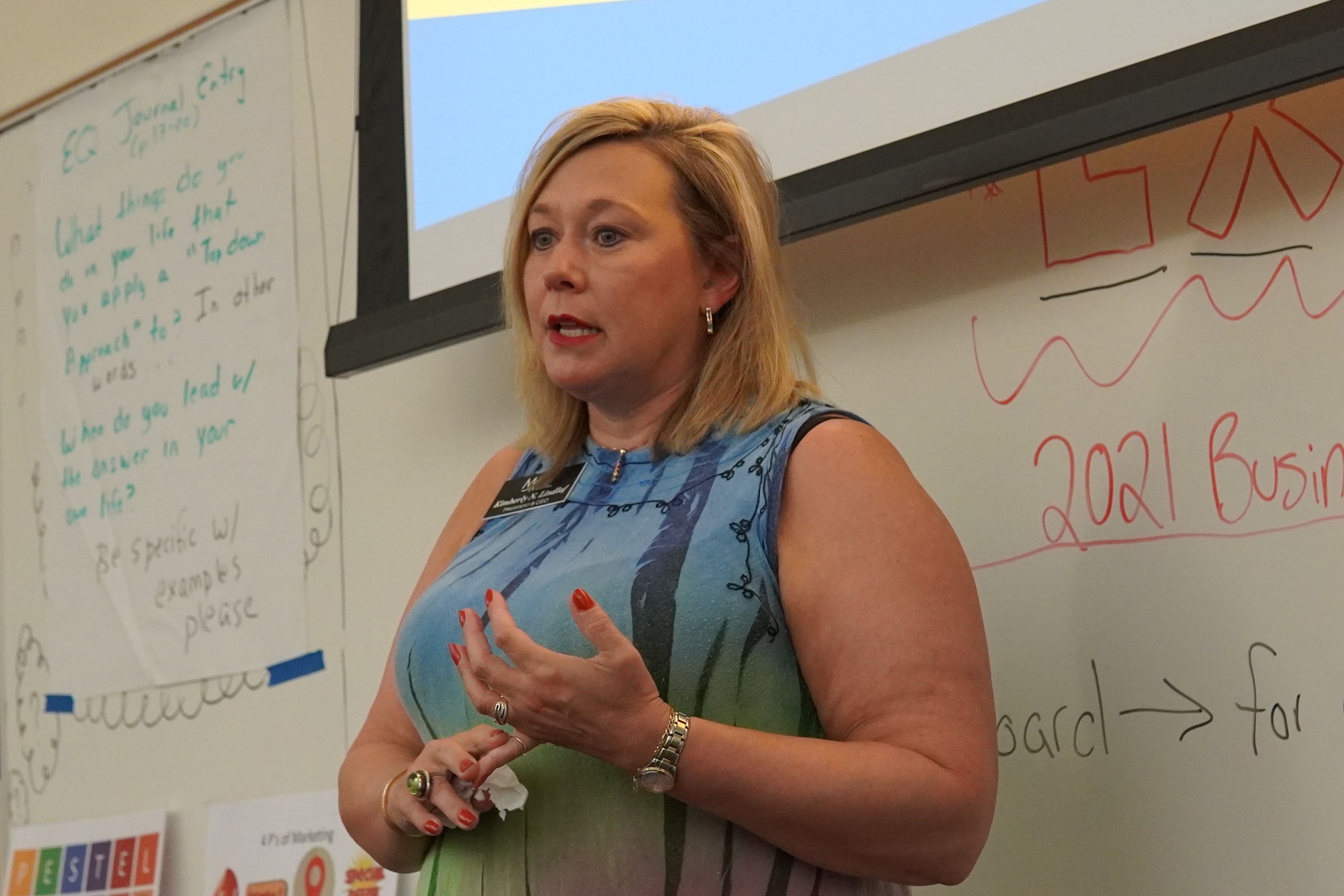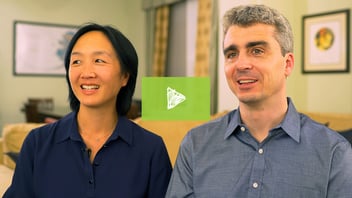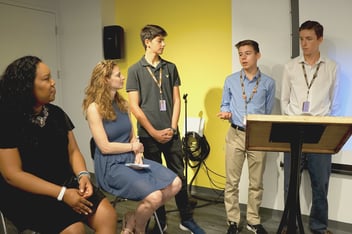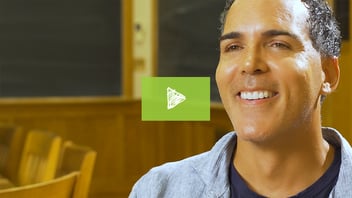The Old Paradigm of Learning Business Has Changed: EXPLO’s Dean of Studies and the Co-founder of diiVe Discuss

I had the pleasure of speaking with Adam Lavallee and Elspeth Boynton, two of the driving forces behind our Entrepreneurship with Social Impact Pre-College + Career Concentration, about business and entrepreneurship in the modern world — and how the evolution of business has impacted our Pre-College + Career Program pedagogy, goals, and outcomes.
Dr. Adam Lavallee is Dean of Studies at EXPLO. He strives to positively impact the world by creating networks of learners and practitioners.
Elspeth Boynton is the CEO and Co-Founder of diiVe, a global learning organization based in Cape Town. Their mission is to create a globally inclusive network of 100,000 young leaders by 2050 who are empowered to integrate skills and purpose in order to bridge social, economic, and environmental divides.
Read on to find out more.
Adam, you mentioned that the old paradigm of learning business has changed. Can you elaborate on that?
Adam: The ways we start, scale, and run businesses have changed. It’s now about building purpose, building an ecosystem of collaborators and connections.
All of our Pre-College and Career Concentrations are designed to center around the future of work. And the reality is, when young people enter the world of work, they're going to need to be entrepreneurial in their attitude, in their experiences, and how they go about solving problems — whether it's starting their own company or working within a company. I think that students are going to come away from our Entrepreneurship with Social Impact Concentration with a lot of those skills.
Elspeth, can you describe diiVe's mission?
Elspeth: diiVe exists to develop young people's agency. And when we say agency, we mean the mindset, the skills, the capabilities, as well as a sense of purpose, a direction that they're seeking, in order to build the world in which we all want to live in. So we're very eco-driven; we're focused on building a student's 21st-century skills, new-normal skills — ones that they'll need when they graduate from university.
So we run this kind of high-intensity program both virtually and in-person in Cape Town. We recruit across the entire world at top leading universities, and we offer tech as well as consulting-driven programs — because we believe that students not only need to have entrepreneurial skills and understand business, but also how data is used to solve the problems we all face today.
diiVe sounds amazing — and similar to EXPLO in many ways. The Concentration that we're talking about today is called Entrepreneurship with Social Impact. You talked a little bit on it, but what is the value of the social impact lens on entrepreneurship?
Elspeth: At the moment, we see a huge push, particularly during COVID, for businesses to wake up and be more conscious of the way that their business impacts society and the world at large.
I think that push has shown that students are entering the working world needing to understand systemic challenges in a deeper way, and needing to be able to understand the social implications of businesses and how they operate. So understanding that societal challenges, business challenges, economic challenges — they're all connected.
Can you tell us more about the skills emphasized in the Concentration, such as agile teaming and intrapreneurship?
Elspeth: There are so many skills that are necessary in order to lead. And we did focus a lot on leadership — because as an entrepreneur, you need to lead your team, you need to lead with others, to ensure that you're creating value and you're able to build a successful and sustainable business.
You also need to understand how to lead yourself before you can go in and lead others. So we really started the curriculum with an understanding of self, grounded in purpose and your own sense of purpose — through guided journaling exercises, and deciding how that connects to your passion for entrepreneurship while you're exploring it through the curriculum. We talked about building an entrepreneurial spirit, and building skills like agility, adaptability, resilience…these are all what we call (or used to call) “soft skills,” but they're actually really necessary.
And even networking and understanding how to deeply listen and empathize with both customers and other stakeholders — you can't collaborate or innovate if you don't have those skills. We’re trying to inspire students to see a world of opportunity, even though we exist within a system of great divides. We want to foster their understanding of where they fit in and where they can drive their own sense of impact through becoming an entrepreneur and starting something based on the needs they see in the world — or entering a company and driving innovation as an “intrapreneur.” They can innovate those spaces through old, broken systems that need to be changed within companies, or companies that are consulting others.
For hard skills, we think about design thinking and agile teaming, understanding business models and frameworks, and how to scale and how to set metrics for your business. Those are the key principles you learn as an entrepreneur. But at the end of the day, it's the soft skills that really make or break the network, and understanding how to leverage networks that make or break an entrepreneur.
We want students to understand that the goal is to innovate around a need that exists rather than just putting a prototype out there for the sake of building a prototype. So really, shifting students’ mindsets around that — and having them tackle a real challenge at the end, applying all of those skills they developed throughout the program in a real, live case.
Adam, can you tell me about some of the experts, guest speakers, and collaborators involved with the Concentration?
Adam: EXPLO has always collaborated with the local communities and experts that are close to us. One highlight of this course is going to be Marc Cosentino, who is really the architect of the case study preparation model, in which many case interviews are done in business schools and with consulting. He's going to be leading a session. I've seen that in action in previous summers, and it's something that I think our students benefit a lot from.
We're also partnering with local entrepreneurs to hear their stories, their triumphs, their failures, how they've progressed — partially so that our students can start to build their network, but also just to know that they're not alone in their journey. And we're working on partnerships with local organizations so that students are actually working within the community.
We have a history of connecting with impactful businesses. Most recently, in 2021, we were in Waterville, Maine for the summer, and EXPLO students consulted with Saddleback Mountain to put their skills into action. Our students evaluated the landscape Saddleback was facing as it contemplated reopening; they spoke directly to the General Manager of the resort asking targeted questions to identify strengths, opportunities, and risks. Students used the toolkit they developed at EXPLO to analyze data and conduct research to ultimately pitch sustainable solutions to actual stakeholders. We expect our new crop of students to be ready to do the same type of work this summer.
And will students be able to earn college credit for this Concentration?
Yes, all of our Concentrations in the Pre-College and Career Program are available for college credit through our academic partnership with Sarah Lawrence College. And actually, Entrepreneurship with Social Impact is also available for credit with Hampshire College, so students have a choice for where they might want to receive that credit.
As educators, we’ve had to shift online for much of the last two years. What value will having the EXPLO Pre-College and Career program in person and on campus bring for these students?
Elspeth: Well, it's going to be super interactive. And we're going to really test students’ ability to adapt, test their agility, and their ability to connect the dots, because they're going to be learning a lot. And then they're testing those skills immediately, which is an iterative learning model.
They're going to be testing it in a case study that's going to run throughout the program; they're going to be working in small teams — all of this is going to mirror the design sprint, the Google Design Sprint we're running in week two around their challenge to really put them in a position where they run through it beforehand. So the second time around, when they're working with a real client, a real social challenge, and there are real stakeholders that are impacted by this challenge, that they're ready to go. They understand the process and framework.
They've also been given the basics, the key principles, the concepts, the business terminology, the foundations of entrepreneurship, and how to start, build, scale, and sustain a startup. They also gain an understanding of the systemic challenges that Adam had mentioned. We're looking to the UN Sustainable Development Goals. And a lot of businesses are actually now creating indicators and metrics around their performance as to whether or not fulfilling some of those goals. So it's really important that the students also start getting used to this kind of global framework and systems.
But it's going to be immersive, it's going to be cross-cultural — we want to bring in business leaders and executives from around the world. So they get that global perspective, and a lot of teaming and then reflection time. So having time to reflect on what's happening: what are they learning, why are they learning it? And is it important to them? How are they feeling about the content?
I don't think many organizations and this is what is great about EXPLO and diiVe, is that we ask our students once they've learned a concept or topic: Do you care about this? I mean, when does that get asked in school? When you're learning math or history, no one asks, “Do you care about this?” Or “What does this mean for your career?”
I think they're going to get really excited because we want their opinions, we want to hear from them. We want them to be engaged and interacting with each other, as well as with the business leaders and the coaches we bring on board. And I think it'll be unlike anything they've experienced before. So there might be some fear, or maybe resistance at first. But then, as soon as students start opening up, they're going to really enjoy it.
Adam: And one of the things I think is fantastic about the EXPLO experience across the board, and is definitely emphasized in the Entrepreneurship with Social Impact Concentration, is that we're bringing together like-minded students. So if you're a high school student, you might be one of three or four people in an entrepreneurship club. Well, now you're in a section that has 15 students that have decided to spend two weeks immersing themselves in entrepreneurship.
And that section is maybe three or four sections that are running simultaneously. So there might be 50 students on campus who have all said, “I'm interested in entrepreneurship with social impact.” And being in a space where you have like-minded students is a unique opportunity for these students to start their journey. It's not that they're going to talk about how to build a network or ecosystem, it's going to start right on day one. Their roommate might be the person that they start a company with or that they reach out to 10 years down the line because they're still connected, and they can collaborate on something.
Any final thoughts?
Adam: I'm really excited about this Concentration, and students’ excitement will really set them up for success here. There are no prerequisites, you don't have to have taken an economics or business course, just a mindset of being ready to try with an open mind. Elspeth mentioned failure — the only way to learn is to have something not working. So they say, “I know that doesn't work. Let me try this other way.” EXPLO Concentrations give students the opportunity to try, fail, and try again in a supportive learning environment.
Our students are going to build skills that are transferable beyond just the coverage we have in our Concentration. It will really be something that they're going to look back on as a major building block in their entrepreneurial lives.
Thank you both so much for being here today.
We’re all incredibly excited about our newest Pre-College + Career Concentration. If you have any questions about the program, feel free to schedule a call with an Admission Counselor — or attend one of our Info Meetings for a deep-dive into EXPLO Summer Programs.



